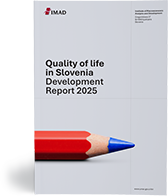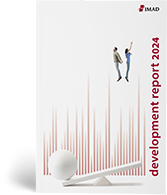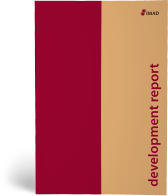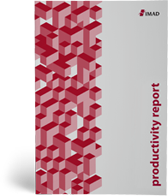Public finances
The global financial crisis led to a significant deterioration of the state of public finances and the situation only started to improve after 2015. The exceptional health and economic circumstances resulting from the COVID-19 epidemic led to a renewed deficit and an increase in public debt in 2020, and the Government has taken on the burden of mitigating the impact of the epidemic through support measures. The state of public finances improved again in 2021 and 2022. Today, the short-term challenges and the challenges of the green and digital transformation and an ageing population are increasingly intertwined, which will have an impact on the future development of public finances when it comes to finding a balance between the stabilising and developmental role of public finances.
Quality of life in Slovenia – Development Report 2025
Slovenia ranks in the top half of EU Member States on most global composite indicators of quality of life.
In the area of social development, the gap between Slovenia and the EU in terms of the population's material well-being has narrowed in recent years, alongside positive developments on the labour market. Income, wealth and wage inequality remain among the lowest in the EU, as do the AROPE…
Development Report 2024
In Slovenia, a robust post-COVID-19 economic recovery, supported by improved conditions in trading partners and substantial fiscal policy measures, was followed by a slowdown in economic growth and an increase in inflation in 2022 and 2023 in the context of the energy crisis. The impact of rising cost pressures on competitiveness and the population's lower purchasing power was cushioned by…
Development Report 2023
The Slovenian economy recovered quickly from the epidemic, supported by an expansionary fiscal policy. GDP per capita in purchasing power standards reached 92% of the EU average last year, the highest level ever recorded. The measures taken to support the population during the epidemic and the period of rising energy prices significantly mitigated the impact of both crises on the social and…
Development Report 2022
Slovenia’s economy saw a quick rebound in 2021 with the help of massive government measures that kept the material and financial situation of the population relatively stable. The burden of the epidemic assumed by the government was reflected in a high general government deficit and an increase in general government debt, especially in 2020. The main challenge remains to overcome the development…
Development Report 2021
The Development Report, an annual publication prepared by the Institute of Macroeconomic Analysis and Development, which monitors the realisation of the Slovenian Development Strategy 2030, brings important recommendations for development policy. Short-term priorities continue to be highly related to preventing the spread of the covid-19 epidemic and mitigating its socio-economic consequences.…
Development Report 2020
In March 2020, a coronavirus epidemic was declared in Slovenia, which, with its enormous negative socio-economic impact on the economic and social situation, will significantly change the baselines for the realisation of the Slovenian Development Strategy 2030 (SDS), which is monitored by the Development Report – an annual publication prepared by the Institute of Macroeconomic Analysis and…
Economic issues 2019
Economic Issues has been dealing with topics that require an economic policy response since its first edition in 2007. This year’s publication focuses on:
- tackling labour shortages
- financing social protection systems.
- developments in the area of public finances.
Productivity Report 2019
In 2018 IMAD started to carry out the tasks of a national productivity board, one of the key ones being the preparation of an annual productivity report. Productivity analyses have been part of IMAD's regular publications for many years, but this year we publish them also separately for the first time. In addition to a regular overview of trends and drivers of productivity, we also present an…
Development Report 2019
Since 2016 Slovenia has again been narrowing its development gap with the EU average, social inclusion of the population remains relatively high, while the efficiency of energy and resource consumption has improved somewhat. These are the key findings of this year’s Development Report of the Institute of Macroeconomic Analysis and Development. In certain areas, developments deviate from the…
Economic issues 2018
In Slovenia, pressures on wage growth are strengthening mainly as a consequence of strong economic growth, demographic trends and uncertain wage policy in the public sector. Such circumstances emphasise the need to design an effective wage policy. In the public sector, an effective wage policy taking into account the financial capacity of the government is closely related to employment policy,…





